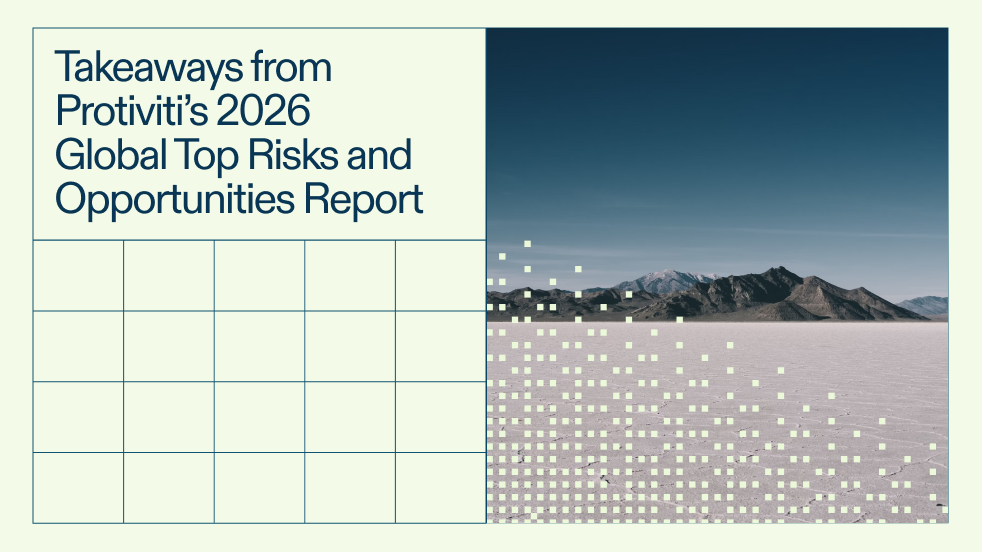
July 28, 2022 • 8 min read
Cynthia Cooper Reflects on WorldCom and the Power of Choice
Join Richard Chambers for a new episode of his Agents of Change video series, featuring conversations with internal audit leaders from some of the world’s most prominent organizations about innovation in the profession.
In the first of two episodes, Richard sits down with Cynthia Cooper — CEO of Cooper Group, LLC and one of Time Magazine’s persons of the year for her role in unraveling and reporting what would become the largest corporate fraud in history at WorldCom. In this episode, Richard and Cynthia discuss their experiences and the larger legacy of the WorldCom scandal, including:
- What WorldCom has taught us about the power of choice and the importance of a transparent, ethical culture.
- How to find your courage when faced with the situations that are part of every auditor’s career.
- Why empathy — even with those who have committed fraud — is a crucial skill that makes for better auditors.
Watch the full conversation — the first of two episodes — and read the can’t-miss highlights below.
Reflecting on WorldCom Twenty Years Later
Richard Chambers: Cynthia, I recall it wasn’t long after the WorldCom story broke that you and a colleague came and sat down with Bill Bishop and me at The IIA, and we spent an afternoon allowing you guys to share the experiences you’d been through. I still remember those events like they were yesterday.
“Cynthia Cooper: I remember that. That was a poignant moment for me as well. And Bill Bishop was one of the first people who reached out to me after the WorldCom fraud, along with Joe Wells at the ACFE. I so very, very much appreciate the support that you guys gave my team and me during that very difficult time.”
Richard Chambers: Yeah. It was a learning experience for me. I came to The IIA at the end of 2001, and Enron had just happened and WorldCom was about to happen. I felt like I was going to a clinic on how corporate frauds unfold, and you were instrumental in helping me understand that.
“Cynthia Cooper: I remember when Enron occurred, Congress thought it was just one bad apple. Sarbanes-Oxley was close to passing, and then they put the brakes on it.”
Richard Chambers: That’s right. As I shared in a blog not long ago, it was what I considered the most consequential internal audit in history, which got everything rolling again and got Congress fully committed to putting the kind of legislation together that we needed. With 2022 being the 20th anniversary of the WorldCom debacle, I’m sure you’ve had a chance to reflect a lot on that experience. What do you think is an overarching lesson or lessons for corporate America from the WorldCom events?
“Cynthia Cooper: I think there are so many lessons, it’s so multifaceted. One is a lesson about human nature — fraud has been with us since the beginning of time and will probably always be with us, right? Looking at the common threads across not only WorldCom, but Enron and Tyco and all of these big scandals, a lot of them were driven by pride, greed, fear, and misguided loyalty. Behind the accounting machinations of the fraud schemes themselves, these were really stories about people and choices. We all have the power of choice. You can give it away, but nobody can take it from you. That’s one of the lessons.”
Richard Chambers: Sadly, there are a lot of things that have improved in the last 20 years, but I think with some of what you’re describing, there are still huge challenges, and they create great underlying risks for organizations.
Courage and Integrity in Extraordinary Circumstances
Richard Chambers: As I look back on your career, as you so eloquently shared in your book, Extraordinary Circumstances: The Journey of a Corporate Whistleblower, I think you’ve symbolized two absolutely vital traits of an internal auditor. You brought integrity and courage to your role. How do you differentiate between integrity and courage, and how challenging was it in a place like WorldCom, considering all the obstacles you faced?
“Cynthia Cooper: I view integrity as making sure that you have well-defined moral values, that you know what you stand for, know what you believe in, and that you have the will and the courage to live by those values. I think courage is just one value — and probably one of the most important values, because if you can’t find your courage, then obviously you can’t stand up and live by your values when you find yourself at a tough crossroads.”
Richard Chambers: I point out that I’ve known very honest people who didn’t have the courage to call out misbehavior or the courage to do something when they saw something that was clearly wrong. I think that’s why it was so important for WorldCom and for corporate America to have someone like you who could bring both of those to bear in those extraordinary circumstances.
“Cynthia Cooper: Oh, thank you. As you know, I talk to students all the time, and also next generation auditors, and I try to encourage them to find their courage. I tell them we all have courage within us. We just have to dig down deep and find it sometimes.”
Richard Chambers: Oh, that’s so true. I’ve been telling people in leadership roles in internal audit that they need to read your book, and if they couldn’t have done the same things you did, that they should ask themselves whether they’re in the right role.
“Cynthia Cooper: As we both know if you’re in the internal audit profession long enough, you are going to find yourself in positions of pressure. You’ll find yourself in a position where you’re giving bad news and people don’t want to hear it. So it really is part of the career, and I think it’s important to get comfortable with being uncomfortable at the very beginning of your career.”
Richard Chambers: That’s an absolutely great way of putting it. You’ve got to be prepared for the worst, and then you’ll never find yourself in a situation that you can’t handle.
Advice for CAEs in a Difficult Situation
Richard Chambers: You know, one of the most compelling aspects of your story is that not only did you have to face down powerful executives at WorldCom, but you had to do so without the enthusiastic backing of your audit committee. What advice would you give to a chief audit executive in particular who finds that they’re in a difficult situation with a difficult message, but aren’t sure how it’s going to be received by the audit committee?
“Cynthia Cooper: I think my advice would be to, first of all, continue going back to the facts and separate any emotion from the facts of the issue. Make sure that you do your homework before you go to the audit committee. Think about different ways that you might be able to communicate the situation, because sometimes it’s not just what is said, but how it’s said. Communication can be very important, perhaps giving different options if there are different paths that can be taken for resolution.”
Richard Chambers: Cynthia, as I said, I’m so impressed, not only with your courage and integrity from the experiences that you went through at WorldCom, but also the leadership that you showed as the CAE. I know that there were times where there was a lot of pressure and a lot of stress, not only on you, but on the entire team as that audit was being undertaken. Yet I think it was your unwavering strength that got them through it, and it was that leadership. What leadership traits, in addition to courage and integrity, do you think chief audit executives need to have?
“Cynthia Cooper: Let me start just by saying that I was blessed to have an amazing team, and an incredible leadership team. Any one of my directors could have stepped right into the chief audit executive position. I decided early on that if I could not hire many people that I would hire the best. So I was fortunate to have a highly qualified, highly skilled team around me.”
Lessons Learned From Adversity — Priorities, Identity, Empathy
Richard Chambers: Cynthia, it’s been said that we learn the most about ourselves in times of adversity. What would you say that you learned about yourself in that period that maybe you wouldn’t have seen about yourself before?
“Cynthia Cooper: To this day, I can tell you that going through what I went through at WorldCom was the most difficult time in my life. It was the worst trauma. I think I probably still have some PTSD from going through that, watching all that suffering, people losing their jobs and their retirements. I grew a tremendous amount through that experience, and also through the last 20 years. When you go through something like that, it makes you really stop and think about your priorities. What matters most in life? What are your values? How do I want to spend my time? Those are some of the things that I began to grapple with.”
Richard Chambers: I recall as I read your book, I felt there were several times that you had real empathy for some of the underlings who had gotten caught up in this. People who were just sort of following directions. I think so often as auditors, we see everything in black and white, and we don’t stop to put ourselves in someone else’s shoes and say, “I can almost see how they get caught up in that.” We don’t excuse it, and we don’t sweep it under the rug, but that empathy helps us, I think, to understand the circumstances people found themselves in.
“Cynthia Cooper: I think so too. I think empathy helps us to understand what the drivers of fraud are, the temptations, and to be better auditors, really. I don’t think that in the case of WorldCom, the mid-level managers who were complicit were bad people. I think they were pretty average citizens. I remember giving a presentation a number of years ago with the lead prosecutor who prosecuted Bernie Ebbers, the CEO, and he said, “I’ll take it a step further.” He said, “I don’t think anyone in this particular case all the way up to the CEO level was, quote, a bad person. But you don’t have to be a bad person to make terrible decisions that can end up ruining your life and the lives of other people.””
Stay tuned for Part 2 of this interview, and check out more audit leader interviews with Richard Chambers on our Agents of Change video series channel.
Cynthia Cooper is an internationally recognized speaker, consultant, best-selling author and advocate. She is CEO of CooperGroup LLC. In 2020, Cynthia was selected by TIME Magazine as one of the 100 most influential women of the last 100 years. In 2002, she was named one of TIME Magazine’s Persons of the Year for her role in unraveling and reporting what would become the largest corporate fraud in history at WorldCom. Connect with Cynthia at ccooper@coopergroupllc.com.
You may also like to read


Audit reporting best practices: Guide for audit leaders

Latest data on AI adoption reinforces need for internal auditors’ “superpowers”

AuditBoard and IAF report: The more you know about AI-enabled fraud, the better equipped you are to fight it

Audit reporting best practices: Guide for audit leaders

Latest data on AI adoption reinforces need for internal auditors’ “superpowers”
Discover why industry leaders choose AuditBoard
SCHEDULE A DEMO



